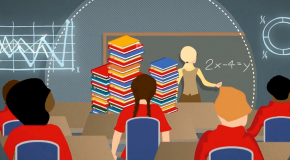Editor's note: To understand the extent to which the skills taught in education systems around the world are changing, and whether they meet the needs of employers and society more widely, Google commissioned research from The Economist Intelligence Unit (EIU). The EIU surveyed senior business executives, teachers and students. The key findings of the survey and the main issues raised by educators and students were discussed by a diverse panel at the opening session of Education on Air, the free online conference from Google on May 8th. Read the full report here.
With rapidly evolving business needs, technological advances and new work structures, the skills that will be needed in the future are shifting. In response to these changes, policymakers, educators and experts around the world are rethinking their education systems.
During Education on Air, a panel of education experts participated in a discussion aimed at understanding how to best adapt education systems to the skills needs of the future:
- Ken Shelton, Educator, Trainer & Google Certified Teacher, USA
- Jaime Casap, Global Education Evangelist, Google, USA
- Jouni Kangasniemi, Special Adviser to the Ministry of Education & Culture, Finland
- Nicole, a secondary student from Isle of Portland Aldridge Community Academy, UK
- Zoe Tabary, Editor, Economist Intelligence Unit, UK
The panel considered how to best help students learn and adopt the skills and attitudes that employers in the increasingly digital and networked economy require.
According to the EIU's research report, sponsored by Google for Education and presented by EIU editor Zoe Tabary during Education on Air, problem-solving, teamwork and communication are the most needed skills in the workplace.
This video provides a short summary of the EIU report.
But it seems that education systems have not yet responded to this demand; only a third of executives say they’re satisfied with the level of attainment of young people entering the workplace. Even more striking is that 51% of executives say a skills gap is hampering their organisation's performance. Students and educators paint a similar picture.
Panelists echoed the research by suggesting that education systems often lack the capacity to teach a wider range of skills—namely problem-solving, digital literacy, leadership and creativity—that would complement more conventional skills, such as numeracy and literacy. Time constraints, lack of flexibility and a reluctance to innovate with the curriculum are a few of the causes mentioned. For Jouni Kangasniemi, senior advisor to Finland's Ministry of Education and Culture, the key question was how to really embed these skills throughout the curriculum rather than just add them to the mix of skills and subjects.
Progress is being made, however, and panelists shared examples of how the education system is adapting to changing demands. Examples from the Finnish education system, presented by Mr Kangasniemi, suggest that learning results in this area improve when teachers have a certain degree of freedom and trust to adjust the curriculum to the learning styles of the students. Teaching becomes more personalised and student-focused, and supports learning, with questions exchanged collaboratively between teachers and students rather than teachers simply presenting answers and facts.
Technology also plays a central role in skills development. According to the research, 85% of teachers report that IT advances are changing the way they teach—but only 23% of 18-25-year-olds think their education system is very effective at making full use of the technologies now available. With the pace of technological change accelerating, education systems should respond by offering training and platforms for teachers that effectively use technology and better equip students for both today’s and tomorrow’s workplace.
Jaime Casap, global education specialist at Google, stressed the need to focus on teaching mindsets, rather than skills. "Skills can become obsolete—there is a finite timeline when they can be used or applied," Casap argues, whereas an inquisitive approach that seeks to solve problems will always be necessary, no matter what issues humanity will need to grapple with in the future. The question is how we can build a culture and environment—and education models—that prepare students to meet any challenge as future digital leaders.
The views and opinions expressed in this article are those of the authors and do not necessarily reflect the views of The Economist Intelligence Unit Limited (EIU) or any other member of The Economist Group. The Economist Group (including the EIU) cannot accept any responsibility or liability for reliance by any person on this article or any of the information, opinions or conclusions set out in the article.







